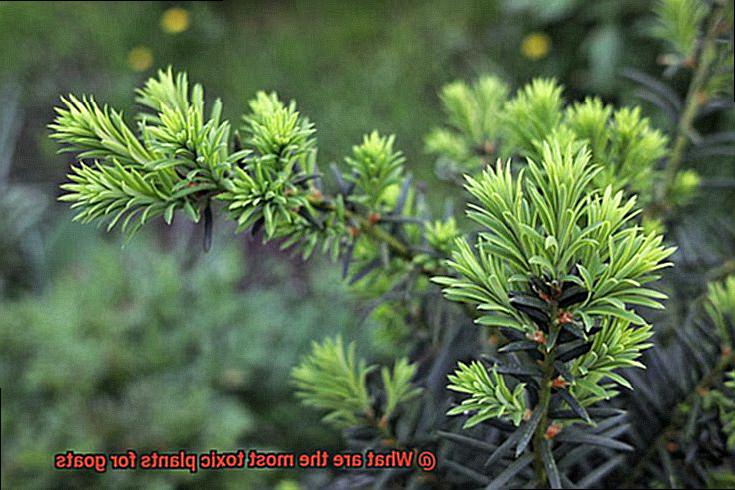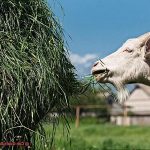Thinking of adding some goats to your farm or backyard? These curious, lovable creatures are a joy to have around and can provide you with milk, meat, and manure. But before you let them loose in your lush green pasture or garden, it’s essential to understand which plants can be poisonous to them. A lack of knowledge about toxic plants could prove deadly for your goats if they unknowingly munch on something harmful.
In this blog post, we’ll take a closer look at the most toxic plants for goats. We’ll explore everything from common ornamental plants found in gardens to seemingly harmless weeds. Our goal is to arm you with the knowledge you need to identify these dangerous plants and take steps to protect your goat’s health.
Join us as we dive into the world of poisonous plants for goats and uncover fascinating details about the toxins hiding in your garden. From rhododendrons to oleanders, we’ll discuss how these plants can affect your goats and what you can do to keep them safe. So grab your farmer’s hat, sit back, and let’s get started.
Poisonous Weeds: Milkweed, Jimsonweed, Nightshade, and Hemlock
Contents
This means providing a safe environment to graze and ensuring they have access to healthy feed. However, some plants can be harmful or even deadly to goats if ingested, including milkweed, Jimsonweed, Nightshade, and Hemlock.
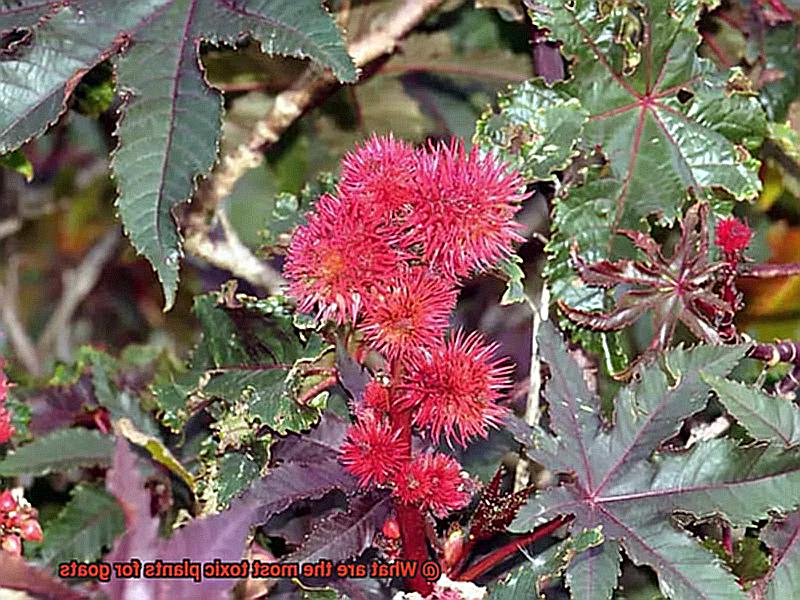
Milkweed may seem like an innocent plant, but it’s one of the most toxic for goats. If ingested, it can cause cardiac distress, seizures, and even death. Similarly, Jimsonweed contains alkaloids that can cause respiratory distress, heart problems, and death in goats. Nightshade is another plant that can be dangerous for goats as it contains solanine—a toxin that can cause diarrhea, vomiting, and convulsions. Lastly, Hemlock is a poisonous weed that can be fatal to goats as it contains coniine which affects the nervous system and can lead to paralysis and death.
As an informed goat owner, you need to take the necessary steps to protect your animals from these toxic weeds. Regularly inspecting pastures and removing any potentially harmful plants is crucial. Providing adequate feed and nutrition can also prevent goats from grazing on toxic plants out of hunger or curiosity.
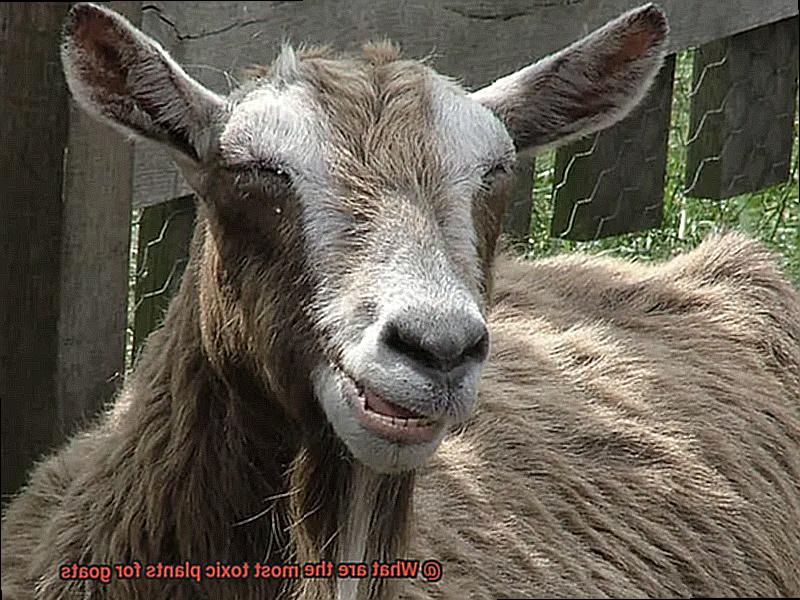
It’s important to keep in mind that different plants may affect goats differently depending on the quantity consumed, age, health of the goat, and other factors. If you suspect that your goat has ingested a toxic plant, contact your veterinarian or animal nutritionist immediately.
Certain Trees: Red Maple, Oak, and Cherry
However, some trees can pose a severe threat to their health. Red Maple, Oak, and Cherry trees are all toxic to goats and can lead to severe health problems or even death if ingested.
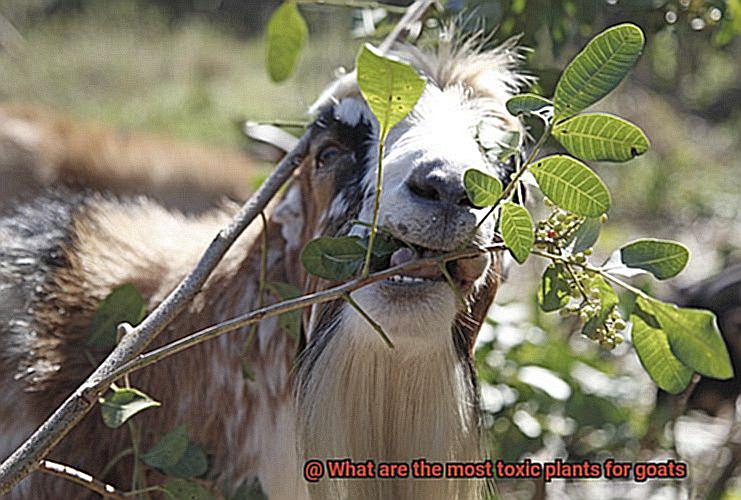
Red Maple leaves contain gallic acid, an insidious toxin that causes hemolytic anemia in goats. This condition occurs when the goat’s body destroys red blood cells faster than it can produce them. The symptoms of hemolytic anemia include lethargy, pale gums, a rapid heartbeat, and dark urine. In severe cases, the goat may collapse or go into shock.
Oak leaves and acorns contain tannins that can cause kidney damage in goats. Overeating oak leaves or acorns can also lead to constipation, diarrhea, and colic. Ingesting these tree parts can also cause neurological symptoms such as tremors or seizures.
Cherry trees contain cyanogenic glycosides in their leaves and bark that release hydrogen cyanide when they come into contact with digestive enzymes. Hydrogen cyanide interferes with the body’s ability to use oxygen, leading to respiratory failure and death.
Ornamental Plants: Lilies, Daffodils, and Rhododendrons
However, when it comes to protecting your goats, it’s not just trees you need to worry about. Ornamental plants, such as lilies, daffodils, and rhododendrons, can also pose a danger if ingested.
Did you know that lilies contain toxins that can cause kidney failure in goats? Or that daffodils contain lycorine, which can result in vomiting, diarrhea, abdominal pain, and even cardiac arrhythmias? Rhododendrons are equally dangerous, containing grayanotoxins that can cause seizures, coma, or even death in goats.
But don’t panic. You can take steps to prevent accidental ingestion of these toxic plants. Keep them out of reach of your goats and remove any fallen leaves or flowers from their grazing areas. If you suspect your goat has ingested any harmful plants, contact your veterinarian immediately. They may recommend inducing vomiting or administering activated charcoal to absorb any remaining toxins in the gut.
Prevention is key when it comes to protecting your goats from toxic plants. Before adding new plants to your garden or landscaping, research them thoroughly to ensure they are safe for your goats. When in doubt about a plant’s toxicity, always err on the side of caution. Providing plenty of safe forage options and monitoring your goats’ grazing habits can also help prevent accidental ingestion of harmful plants.
Fruits and Vegetables: Avocado, Tomato Leaves, Potato Leaves
Incorporating a variety of fruits and vegetables into your goat’s diet can provide them with essential nutrients and new flavors. However, not all fruits and vegetables are safe for goats to consume. In fact, some can be downright dangerous.
Take avocado, for example. While it might be a delicious fruit for humans, it’s highly toxic to goats. This is because avocados contain persin, a toxin that can cause respiratory distress, heart failure, and even death in goats. So, if you’re enjoying some avocado toast, make sure to keep it away from your furry friends.
Tomato leaves may seem like a harmless addition to your goat’s diet, but they’re actually quite dangerous. These leaves contain solanine, a toxic substance that can cause digestive problems, weakness, and even death in goats. While the ripe tomato fruit itself is safe for goats to eat, the leaves and stems should be avoided.
Potato leaves are also toxic to goats and should never be consumed. Similar to tomato leaves, potato leaves contain solanine which can cause severe digestive issues and neurological problems in goats. It’s important to remove any potato plants or leaves from areas where your goats graze.
To ensure the health and safety of your goats, always research the safety of any new plants or foods before offering them. While some fruits and vegetables may seem harmless, they can be deadly to goats. As an animal lover, it’s always better to err on the side of caution when it comes to feeding your animals.
Different Effects Depending on Quantity Consumed
The severity of the effects on your goat’s health depends on the quantity of the plant consumed.
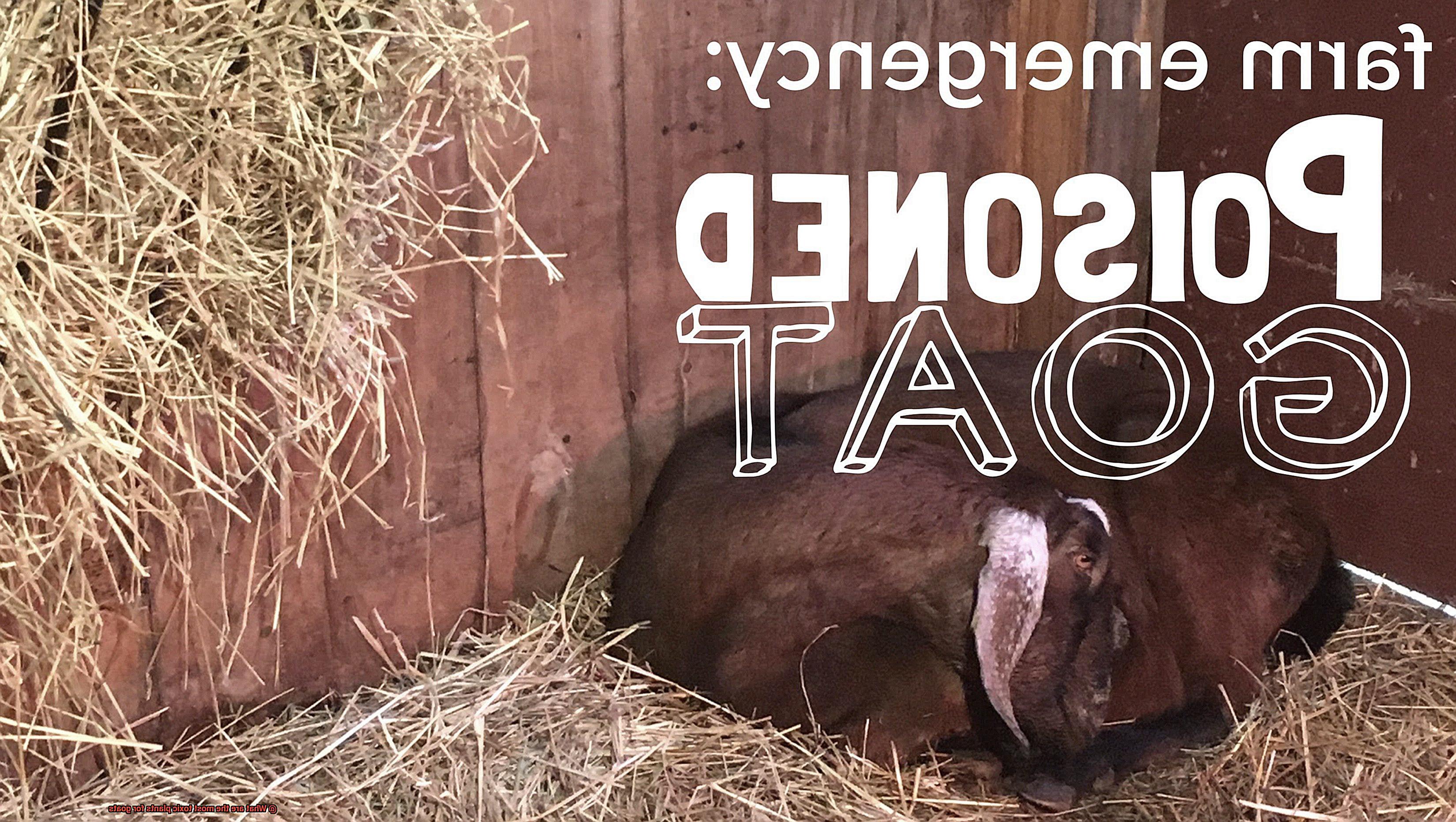
It’s essential to understand that not all plants are equally toxic. Some require only a small amount to be lethal, while others need a larger quantity to cause any significant harm. For instance, poison hemlock can kill a goat even in small amounts, whereas rhododendron needs a more substantial quantity to cause severe damage.
If your goat eats a small amount of a toxic plant, they may experience mild symptoms such as vomiting, diarrhea, or uneasiness. However, if they ingest a large amount, the effects can be much more severe. Seizures, coma, and even death are all possible outcomes.
To keep your goats safe and healthy, it’s crucial to monitor their grazing habits and ensure they don’t have access to any toxic plants. If you notice any unusual behavior or symptoms in your goats after grazing, it’s essential to contact a veterinarian immediately.
Age and Health of the Goat
Younger goats and those with compromised health are at greater risk of poisoning due to their smaller size and less-developed immune systems. However, even healthy adult goats can be affected by toxic plants if they consume a large amount, so it’s essential to be vigilant.
To keep your goats safe and healthy, make sure they have access to safe and nutritious pasture, and monitor their grazing habits closely. As goats age, their digestive systems become less efficient, which makes it more difficult for them to process certain types of food, including toxic plants. Therefore, older goats should be fed a balanced diet that meets their nutritional needs while minimizing their exposure to harmful plants.
In addition to monitoring your goats’ age and health, it’s crucial to be aware of any potential toxins in your pasture or surrounding areas. Common plants such as black walnut trees or rhododendrons can be poisonous to goats, so take care to remove them from your property.
yRvtsjBzjsM” >
Conclusion
In conclusion, goats are charming and inquisitive animals that offer a wealth of benefits such as milk, meat, and manure. However, it’s crucial to be aware of the most toxic plants for goats before allowing them to roam freely in your garden or pasture. Ignorance about poisonous plants could be fatal for your goats if they accidentally nibble on something harmful.
This blog post has delved into the world of dangerous flora that can be lethal to goats, ranging from common decorative plants found in gardens to seemingly harmless weeds. It’s essential to arm yourself with knowledge so you can recognize these hazardous plants and take necessary steps to safeguard your goat’s health. Some of the most toxic plants for goats include Milkweed, Jimsonweed, Nightshade, Hemlock, Red Maple, Oak, Cherry trees, Lilies, Daffodils, Rhododendrons, Avocadoes, Tomato leaves and Potato leaves.
Prevention is key when it comes to protecting your goats from toxic plants. Before introducing new vegetation into your garden or landscaping area research thoroughly to ensure they are safe for your goats. Providing plenty of safe grazing options and monitoring their grazing habits can also help prevent accidental ingestion of harmful plants.
It’s important to keep in mind that different plants may affect goats differently depending on the quantity consumed and the age or health of the goat. If you suspect that your goat has ingested a toxic plant contact your veterinarian immediately.

